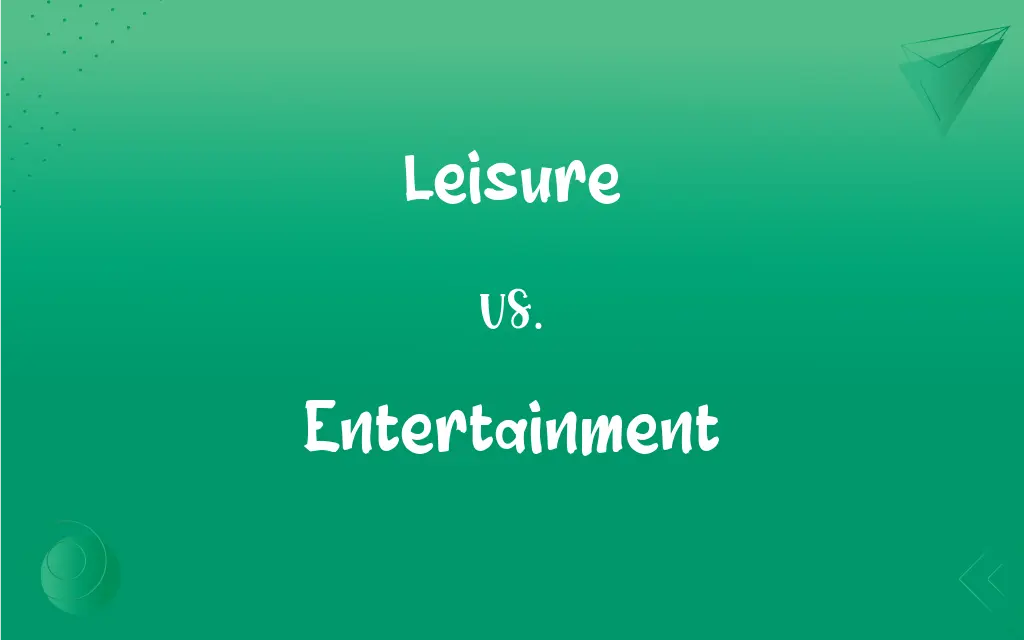Leisure vs. Entertainment: What's the Difference?
Edited by Aimie Carlson || By Harlon Moss || Published on December 15, 2023
Leisure is free time for relaxation or hobbies, while entertainment is an activity designed to amuse or engage.

Key Differences
Leisure refers to free time spent away from work and obligations, often involving relaxing or pursuing personal interests. Entertainment, on the other hand, encompasses activities and events specifically designed to provide enjoyment, amusement, or pleasure to an audience.
Leisure activities are chosen by individuals based on personal preferences and are often self-directed, like reading or gardening. Entertainment typically involves external sources, such as movies, concerts, or sports events, created to captivate and engage an audience.
Leisure can be a solitary or a social activity, often involving introspection or personal development. In contrast, entertainment is usually crafted by others, such as artists, performers, or media producers, to provide a shared experience for an audience.
Leisure activities can be passive or active, and they don’t necessarily require an audience. Entertainment, however, usually implies a performer-perceiver dynamic, where the audience's role is primarily to receive and enjoy the performance or activity.
Leisure is a broader concept that can include any voluntary activities during free time, while entertainment is a subset of leisure that specifically focuses on activities that amuse, divert, or stimulate an audience.
ADVERTISEMENT
Comparison Chart
Nature
Self-directed and personal
Designed for audience engagement
Activity Source
Individual choice
External sources (e.g., media)
Purpose
Relaxation, personal enjoyment
Amusement, pleasure
Audience Involvement
Optional; can be solitary
Central; often involves a crowd
Outcome
Personal fulfillment, relaxation
Shared enjoyment, excitement
ADVERTISEMENT
Leisure and Entertainment Definitions
Leisure
Leisure is a period of relaxation or recreation.
They went on a leisure walk in the park.
Entertainment
Entertainment is an activity designed to amuse people.
The circus provided great entertainment for the kids.
Leisure
Leisure refers to ease or relaxation.
She enjoyed leisure at the beach.
Entertainment
Entertainment is the action of providing amusement.
The movie was a popular form of entertainment.
Leisure
Leisure is time free from work or duties.
She spent her leisure time reading novels.
Entertainment
Entertainment refers to shows, performances, or activities that provide enjoyment.
They went to a comedy show for entertainment.
Leisure
Leisure is the use of free time for enjoyment.
In his leisure, he painted landscapes.
Entertainment
Entertainment is a form of activity that holds the interest and attention of an audience.
Video games are a form of digital entertainment.
Leisure
Leisure is the opportunity afforded by free time.
He used his leisure to learn guitar.
Entertainment
Entertainment is the act of engaging and amusing an audience.
She found her entertainment in watching plays.
Leisure
Free time when one is not working or attending to other duties.
Entertainment
The act of entertaining.
Leisure
Relaxation or activities engaged in during such time
The pursuit of leisure.
Entertainment
The art or field of entertaining.
Leisure
Freedom provided by the cessation of activities.
Leisure
Free time, time free from work or duties.
Leisure
Time at one's command, free from engagement; convenient opportunity; hence, convenience; ease.
Leisure
Freedom from occupation or business; vacant time; time free from employment.
The desire of leisure is much more natural than of business and care.
Leisure
Time at one's command, free from engagement; convenient opportunity; hence, convenience; ease.
He sighed, and had no leisure more to say.
Leisure
Unemployed; as, leisure hours.
Leisure
Time available for ease and relaxation;
His job left him little leisure
Leisure
Freedom to choose a pastime or enjoyable activity;
He lacked the leisure for golf
FAQs
How does leisure benefit individuals?
Leisure provides relaxation, personal fulfillment, and a break from routine.
What is leisure?
Leisure is free time spent away from work, duties, or stress.
Is entertainment always a part of leisure?
Not necessarily; leisure can include activities beyond just entertainment.
Can leisure activities be entertaining?
Yes, many leisure activities can also provide entertainment.
What are common forms of entertainment?
Movies, music, sports, and performances are common forms of entertainment.
What constitutes entertainment?
Entertainment includes activities or events designed to amuse or engage an audience.
How has entertainment evolved with technology?
Technology has expanded entertainment forms, including digital and interactive media.
Can entertainment have educational value?
Yes, many entertainment forms can also be educational.
Are all forms of entertainment accessible to everyone?
Not all forms, as some entertainment might require specific resources or access.
What role does entertainment play in society?
Entertainment plays a significant role in cultural expression and social bonding.
Is passive entertainment less valuable than active leisure?
Value is subjective and depends on individual preferences and needs.
What impact has the internet had on entertainment?
The internet has greatly diversified and expanded access to entertainment.
What are some low-cost leisure activities?
Reading, walking, and gardening are examples of low-cost leisure activities.
Can leisure activities be done alone?
Yes, many leisure activities can be solitary, like reading or crafting.
Are traditional forms of entertainment still popular?
Yes, traditional forms like live theater and books remain popular alongside modern media.
Is leisure time necessary?
Leisure time is essential for mental health and personal well-being.
How do cultural differences impact leisure activities?
Leisure activities vary greatly across cultures, reflecting different values and lifestyles.
Can entertainment influence public opinion?
Yes, entertainment can shape cultural trends and public opinions.
How can leisure activities contribute to personal growth?
Leisure activities can foster creativity, learning, and personal development.
Is it possible to have too much leisure time?
Excessive leisure without balance can lead to boredom or lack of fulfillment.
About Author
Written by
Harlon MossHarlon is a seasoned quality moderator and accomplished content writer for Difference Wiki. An alumnus of the prestigious University of California, he earned his degree in Computer Science. Leveraging his academic background, Harlon brings a meticulous and informed perspective to his work, ensuring content accuracy and excellence.
Edited by
Aimie CarlsonAimie Carlson, holding a master's degree in English literature, is a fervent English language enthusiast. She lends her writing talents to Difference Wiki, a prominent website that specializes in comparisons, offering readers insightful analyses that both captivate and inform.






































































